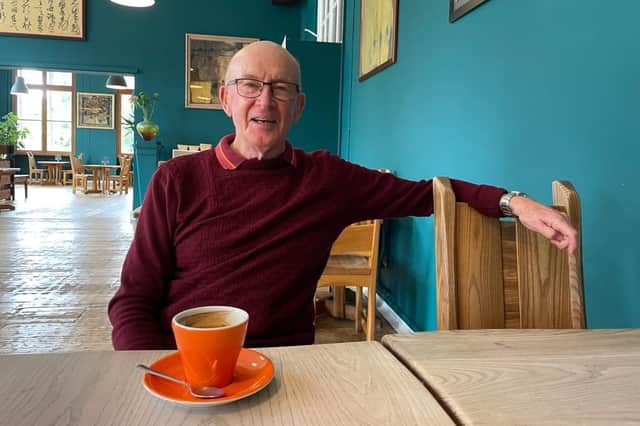Forfar man urges early action to help tackle bowel cancer


Ron Kerr, 82, is backing the Scottish Government’s ‘Be the Early Bird’ campaign this Bowel Cancer Awareness Month, which reinforces the benefits of finding cancer at an earlier stage when there are more treatment options available, a greater likelihood of living well after treatment and better news to tell the family.
The campaign is particularly aimed at those aged 40 and over, and urges everyone with persistent symptoms, unusual for them, to contact their GP practice without delay.
Advertisement
Hide AdAdvertisement
Hide AdThroughout Bowel Cancer Awareness Month, those eligible for bowel cancer screening are also being reminded to return their bowel screening test, as it is often the most effective way to detect bowel cancer in its earliest stages when it is more treatable and can often be cured.
Ron was diagnosed with the disease after initially visiting his GP in October 2013 about persistent constipation. He was then referred for a colonoscopy at Ninewells Hospital in Dundee and further tests confirmed it was bowel cancer.
Following key-hole surgery to remove the tumour, tests confirmed it was stage 1 bowel cancer and he was advised to have a course of chemotherapy as a further precaution. In June 2014, he finished his treatment and was discharged, with tests and consultations required every six months for the next five years.
After five years Ron was discharged from Ninewells, and nine years on from his diagnosis, he remains cancer free.
Advertisement
Hide AdAdvertisement
Hide AdHe said: ““Going to the GP about my symptoms saved my life. I went early and returned when my symptoms continued. Some of the tests around bowel cancer can be a bit embarrassing, but it’s so important to get everything checked out. The doctors and staff who do these tests are used to it, and are great at putting you at ease. I’d say to anyone experiencing unusual symptoms to contact their GP practice without delay.”
Further information can be found at getcheckedearly.org.
Ron added: “I was really pleased to have finished my treatment but initially, I was really scared of the cancer coming back. However, I joined a mindfulness course at Maggie's, which really helped me get past this. Going to places like Maggie’s was definitely the thing that helped me most during my cancer journey, and I can’t recommend the support they offer enough to anyone going through the same thing. You get loads of helpful advice and you don’t feel like you’re dealing with it on your own.
“After my diagnosis, I decided it was important to look after myself as best as I could, and I continue to eat well and exercise regularly today. A couple of years after my treatment, I got involved with Paths for All, a walking group which is mostly made up of people who have had cancer. I still enjoy these weekly walks as a way to get outdoors, keep active, and socialise. I also do a lot of talks for Bowel Cancer UK to help raise awareness of symptoms.
Ross MacDuff, Joint National Clinical Lead for Earlier Cancer Diagnosis at the national Centre for Sustainable Delivery (CfSD) said: “Finding cancer in its earliest stages is really key to maximising treatment options. That’s why it’s so important that anyone who is experiencing persistent symptoms that are unusual for them contacts their GP practice so they can be assessed as soon as possible and referred, if appropriate, to the correct specialist.
Advertisement
Hide AdAdvertisement
Hide Ad“Whether it is you that has possible symptoms, a family member or friend, please don’t put off making an appointment with your GP practice. If cancer is confirmed earlier, a much wider range of treatment options can be available, and the body can respond better to treatment.”
Genevieve Edwards, Chief Executive at Bowel Cancer UK, said: “I would strongly encourage everyone to check their poo and if something has changed or doesn’t look right to you, then don’t wait – contact your doctor. They will want to see you and may ask you to do a test at home to help decide whether your symptoms need further investigation.”